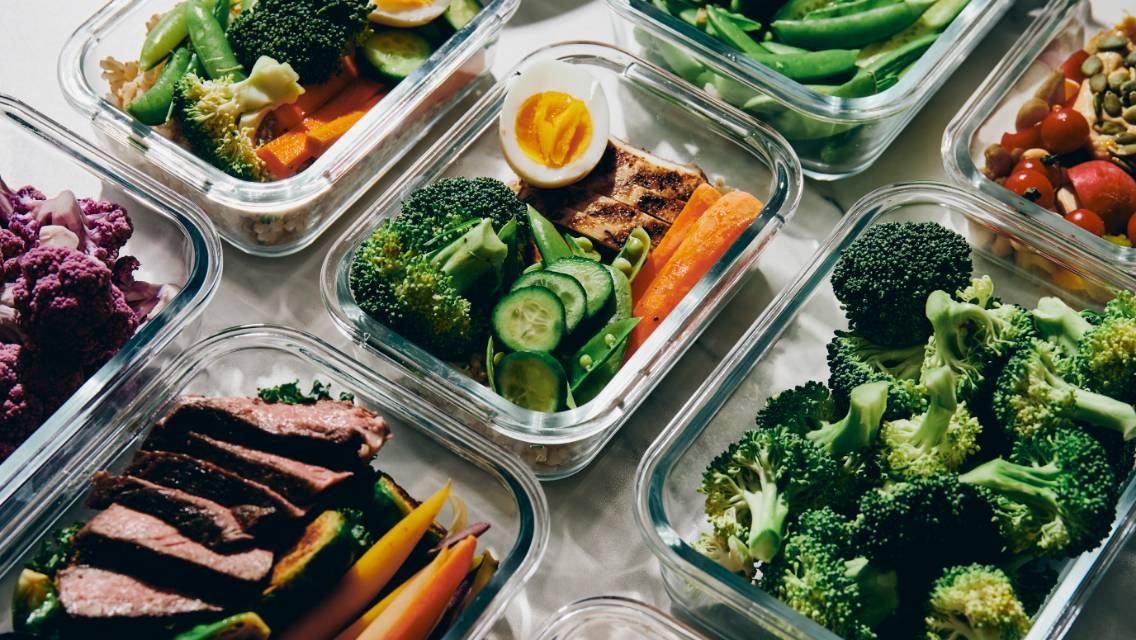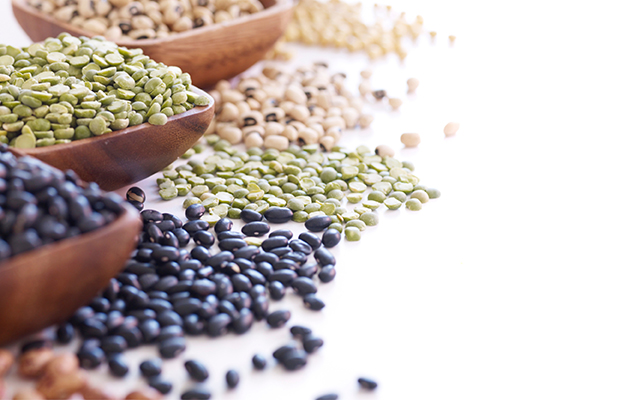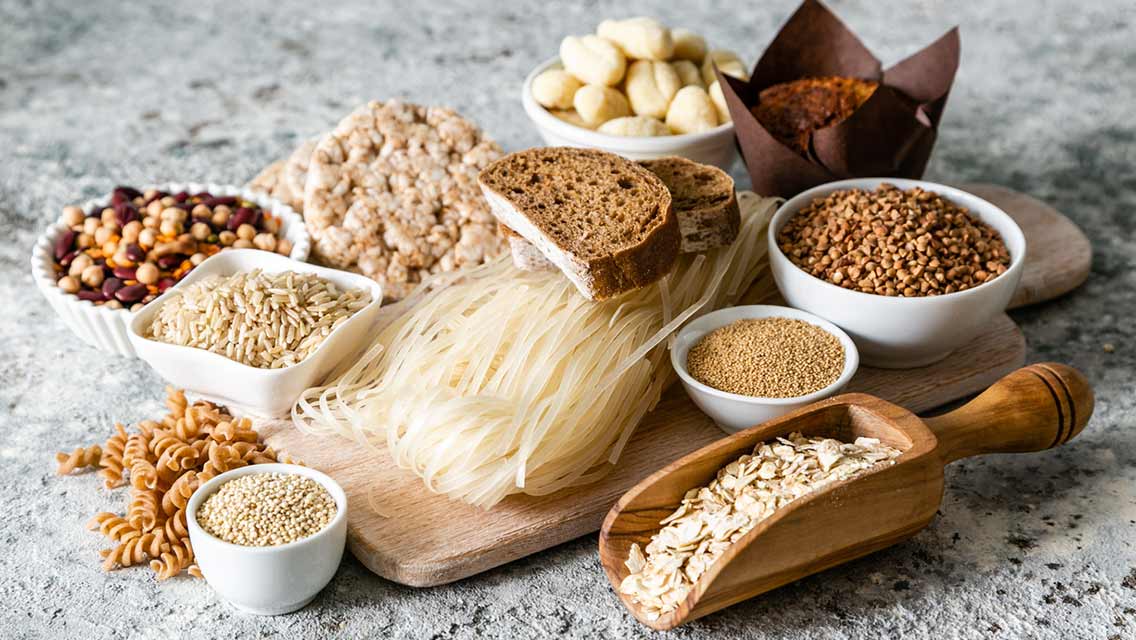Learn more about these key nutrients that support muscle performance, recovery, and growth:
Protein ⋅ Carbohydrates ⋅ Calcium & Vitamin D ⋅ Iron ⋅ Magnesium ⋅ Potassium ⋅ Probiotics & Prebiotics ⋅ Essential Amino Acids ⋅ Creatine
Listen up: Your muscles are hungry! They work for you day and night, and they need to be fed. Proper nutrition helps your body’s 600-plus muscles perform their essential functions; with it, you can progress in your workouts, avoid atrophy as you get older, and more.
“Everyone should care about feeding their muscles,” says Sarah Koszyk, MA, RDN, a registered dietitian and sports nutritionist in San Francisco. “Muscles help with movement, posture, joint stability, and even heat production, which are important whoever you are.”
Most conversations about muscles and diet typically focus on protein because it stimulates growth. But building muscle mass is only part of the picture. Healthy, functional muscles require a well-rounded nutritional regimen that includes macronutrients, micronutrients, amino acids, and probiotics and prebiotics, among others.
These are some of the key nutrients your muscles need for performance, recovery, and growth.
Protein
Every cell in the body contains protein. The macronutrient is composed of amino acids and plays many roles, from providing tissue structure to supporting metabolism. In your muscles, in particular, protein primarily repairs cells and creates new ones, which are vital for maintaining and building muscle tissue.
The proteins inside your muscle cells are in constant flux. Activities like resistance training damage the cells, which then gobble up protein. With your muscle protein stores ebbing, your body must synthesize more — a process known as muscle protein synthesis. Eating enough protein ensures you have a steady supply of this nutrient ready when you need it.
Things get tricky when you’re considering how much protein to include in your diet. Many sports nutrition and aging experts believe the current recommended daily allowance (RDA) of 0.36 grams per pound of body weight per day is the bare minimum — and that it’s too low for active people, as well as middle-aged and older adults.
“As we get older, we actually need more protein than people think and more than we may have needed when we were younger,” says sports nutritionist and strength coach Steph Gaudreau, CISSN, NASM-CPT. This is because age-related changes make our muscles more resistant to growth, so that extra protein is necessary to spur muscle protein synthesis.
Your exact protein needs may vary, but the International Society of Sports Nutrition and National Academy of Sports Medicine recommend 0.6 to 0.9 grams of protein per pound of body weight per day — 96 to 144 grams of protein daily for a 160-pound person — to support muscle growth at any age. For older people in particular, some research suggests that sufficient protein intake may also prevent sarcopenia, the loss of muscle associated with aging.
(Learn more about the power of protein at “Protein Power: What You Need to Know.”)
Eat Up!
- Animal proteins, like poultry, beef, dairy, eggs, and fish and seafood, offer more bang for your buck than plant-based sources: You don’t have to eat as much to get the protein you need, Koszyk says.
- Plant-based foods — think soy, lentils, quinoa, beans, nuts and seeds, leafy greens, broccoli, and potatoes — also provide protein. Vegans and vegetarians must be more intentional about eating a variety of foods to ensure they’re getting enough. (Learn how to get enough protein from a plant-based diet at “How to Get Enough Protein From a Plant-Based Diet.”)
- Supplements can help you reach your daily protein goal, especially if — as with active people and elderly adults — your needs are higher and you struggle to get enough from your diet. Supplements made of whey, a milk byproduct, are a great option because they offer an amino acid composition similar to that of muscles.
- People who are lactose intolerant or follow a vegan diet may opt for supplements that contain multiple sources of protein, including peas, seeds, and rice.
(For tips on incorporating protein powder into your diet beyond shakes and smoothies, visit “10 Genius Ways to Use Protein Powder.”)
Carbohydrates
Carbs may not get as much credit as protein, but this macronutrient is also crucial for muscle health. Carbohydrates are stored in your muscles and liver as glycogen, which is used as energy to spark muscle contractions.
“I think of protein as a macronutrient of building and repair, and carbohydrates as a macronutrient of energy,” Gaudreau explains.
Getting enough carbs is critical, especially if you’re active. “If we have adequately stocked up our glycogen stores, we’re going to have enough energy to get through our workouts and push our strength training a bit harder to see better results,” she says. And that can mean more significant muscle maintenance and muscle building.
Stocking plenty of glycogen in your muscles and liver is also essential to stop your body from dipping into your protein reserves for energy. “If we don’t have adequate glycogen stores to keep our bodies going, what you see — especially in the context of low calorie and low carb intake — is the body can turn to other substances,” she notes.
If your body is forced to break down protein for energy, you may not have enough left for muscle maintenance and repair, leading your muscles to shrink and weaken over time.
Carb needs vary depending on your sex, age, body weight, and activity level, so it may take some experimenting to find the amount that works for you. Gaudreau suggests getting at least 40 percent of your daily calories from carbohydrates and gradually increasing that amount if needed. If you do a lot of endurance training, you may need to go as high as 60 percent.
Eat Up!
- Steel-cut oats, sweet potatoes, pumpkin, spaghetti squash, brown rice, black beans, quinoa, and lentils are great sources of complex carbohydrates that offer plenty of fiber.
(Learn more about the importance of eating fiber-rich foods at “Why You Need to Eat Fiber.”)
Calcium & Vitamin D
You’ve probably heard that this mineral and vitamin combine to promote bone strength. Vitamin D helps your body absorb the calcium it needs to keep your bones and teeth strong and dense. But these micronutrients are also important for muscle function.
Your muscles rely on calcium for sparking the contractions that make them move. (Learn more about calcium at “Why Your Body Needs Calcium and How to Maximize Your Intake.”)
Vitamin D helps regulate muscle contractions, Koszyk explains. The sunshine vitamin — so called because sun exposure can trigger the body to produce it — also helps muscle recovery. And studies have shown that vitamin D can increase your antioxidant capacity, support the health of your mitochondria (the power generators of your cells), and boost muscle regeneration.
Eat Up!
- Dairy products, including milk, yogurt, and cheese, are some of the best natural sources of calcium.
- Canned sardines, salmon, kale, broccoli, and bok choy are good nondairy sources of calcium.
- Calcium supplements can be helpful for people who have trouble getting enough from their diet, including those who are postmenopausal and those who don’t eat dairy. It’s recommended that adults get 1,000 to 1,200 mg of calcium daily.
- Fatty fish such as trout, salmon, tuna, and mackerel are ideal food sources of vitamin D.
- Beef liver, egg yolks, and cheese contain small amounts of vitamin D.
- Vitamin D supplements can compensate for shortages in your diet and of sun exposure. “The majority of the people I work with need vitamin D supplementation because it’s challenging to get enough through food alone,” Koszyk notes. (Find out more about maximizing your vitamin D at “Vitamin D: What You Need to Know.”)
Creatine
Creatine is another amino acid notable for its muscle-supporting benefits. Unlike essential amino acids (EAAs), creatine is not considered essential — your body produces it on its own (more about EAAs in the next section). Specifically, creatine is created primarily in the kidneys and completed in the liver, then stored in the muscle as phosphocreatine, which is used as energy during intense exercise.
So, you might be wondering: What’s the big deal about creatine if the body can just make it?
Well, the body naturally makes about 1 gram of creatine per day. While this may be sufficient for some people, the amount falls short of the 3 to 5 grams that studies suggest are necessary to maintain adequate muscle stores, among other benefits. The nutrient has been shown to support athletic performance, particularly during activities that require rapid recovery, as well as muscle recovery and growth. It can also help counteract age-related declines in muscle mass and bone density.
As an amino acid, creatine can be found in protein-rich foods — but not in all protein sources or in sufficient amounts. It’s only found naturally in animal sources of protein, and in relatively small quantities. (For instance, a pound of uncooked beef contains about 1 gram of creatine.) Going the whole-foods route for creatine raises financial, environmental, and palatability concerns.
That’s where supplementation can be useful: Creatine monohydrate is considered one of the lowest-risk supplements with the highest rewards, says Anika Christ, RD, a Life Time registered dietitian, sports nutritionist, and personal trainer. One scoop of the dissolvable powder can deliver 5 grams of creatine, depending on the brand.
You could benefit most from supplementation if you are actively trying to build muscle; if you’re vegan or vegetarian, or you don’t eat much animal protein; or if you are postmenopausal. (For more on creatine, check out “The Health Benefits of Creatine.”)
Eat Up!
- Seafood and red meat are good food sources of creatine, but they still fall short of providing enough for you to obtain many of the benefits, notes Christ.
- Supplements are a safe way to support your creatine intake and enjoy its muscle-building benefits, she adds. Look for creatine monohydrate, one of the most popular and well-studied sports supplements available, and aim for 5 grams daily.
Essential Amino Acids
Amino acids are the building blocks of proteins, and as a result, these organic chains play critical roles in muscle growth and function, says Christ. Of the 20 amino acids crucial for building protein — and, by extension, muscle — nine of them are considered essential amino acids (EAAs), meaning your body can’t produce them on its own and must get them through food. “When protein is consumed, it’s broken down into individual amino acids, which then work to synthesize new proteins, or muscle,” Christ explains.
Each of these EAAs plays a unique role relating to muscle synthesis, growth, and repair. But not all protein sources contain all the EAAs. In other words, even if you hit your protein goals each day, you may not be ingesting all or enough of the amino acids needed to support your muscles.
Animal sources are considered complete proteins because they contain all the EAAs. There are a few plant-based sources of complete proteins, but these may not contain as much protein per serving as animal sources; vegans and vegetarians should aim to consume a variety of plant-based proteins or consider adding a supplement to ensure they get the right amount of EAAs.
One subgroup of EAAs, known as branched-chain amino acids (BCAAs), is particularly popular as a supplement and stands out for its muscle-building properties. The BCAAs are leucine, which stimulates muscle protein synthesis; isoleucine, which boosts energy; and valine, which promotes muscle growth and tissue repair. BCAAs are commonly taken as a workout supplement, before or after exercise.
Eat Up!
- Meat, poultry, fish, eggs, and dairy are complete proteins.
- Quinoa, buckwheat, soy, and hempseed are also complete proteins, though they may not offer as much protein as animal foods.
- Many plant-based protein sources, including nuts, seeds, legumes, and vegetables, are incomplete proteins, which means they contain some but not all of the EAAs. While this doesn’t mean you should avoid them, be sure to eat a combination of them over 24 to 36 hours to get your complete fill of amino acids.
- BCAA and EAA supplements can be wise additions to your diet if you follow a vegan or vegetarian diet, or if you otherwise struggle to get enough amino acids. (For more on amino acid supplements, visit “Essential Amino Acids: How to Choose and Use Them Wisely.”)
Iron
This mineral is an essential component of red blood cells, which carry oxygen throughout the body. Iron is also integral to myoglobin, a protein that supplies oxygen to your muscles. As such, iron helps your muscles make and use energy for both everyday functions and exercise.
The RDA for iron is 8 mg for adult men and postmenopausal women and 18 mg for adult premenopausal women, though individual needs may vary. If you are pregnant or experience a heavy menstrual flow, consult with your healthcare provider to determine whether you need iron supplements. (Learn more about your iron needs at “Why Your Body Needs Iron.”)
Eat Up!
- Lean meat and seafood are rich sources of iron.
- Nuts, beans, and vegetables are great plant-based sources. Your body doesn’t absorb iron from plant foods as well as it does from animal sources, so you’ll want to pay attention to your intake if you’re vegan or vegetarian.
- Supplements can boost your iron stores if they are depleted. (Menstruation, for instance, can result in an iron deficiency.) Before beginning a supplement regimen, it’s important to have a blood test. If your ferritin levels aren’t low, stick with whole-food sources of iron. If the test reveals low ferritin levels, supplement with the supervision of a medical practitioner. High-dose supplements can cause gastrointestinal problems, and excessive supplementation can lead to serious health issues.
Magnesium
The mineral magnesium is an electrolyte, meaning it carries an electric charge. It helps ferry calcium and potassium into your muscle cells so that these minerals can support muscle contraction. Magnesium — 60 percent of which is stored in the bones — is a critical component of energy production in the body, and it plays a role in various processes, including muscle protein synthesis.
It’s recommended that adult men get 400 to 420 mg of magnesium daily; for adult women, the RDA is 310 to 320 mg, though needs increase to 350 to 360 mg during pregnancy. Because so much of the body’s magnesium is stored in the bones, there’s no reliable test to determine whether you’re deficient. (Learn more about magnesium at “Why Your Body Needs Magnesium and How to Maximize Your Intake.”)
Eat Up!
- Legumes, nuts, seeds, whole grains, and green leafy vegetables are great sources of magnesium. In general, most fiber-rich foods contain this mineral. Refined grains and other processed foods lose magnesium during the manufacturing process.
- Dairy products, like milk, yogurt, and cheese, are also good sources.
- Supplements containing chelated magnesium glycinate support your muscles, but they can produce a laxative effect. Start with the lowest recommended dose and gradually increase it until you find your body’s threshold.
Potassium
Another electrolyte that helps with muscle contraction, potassium is a key mineral for maintaining a healthy balance of fluids inside every cell in our bodies — including muscle cells. It also helps transmit nerve signals, which lead to muscle contractions. In fact, most of your body’s potassium resides in your muscles.
The RDA is 3,400 mg for adult men and 2,600 mg for adult women, though needs increase during pregnancy and while breastfeeding. But most U.S. adults don’t get enough, which concerns public health officials.
The U.S. Departments of Agriculture and Health and Human Services primarily recommend increasing potassium intake through whole-food sources rather than through supplements, which contain paltry amounts of potassium compared with food.
Moreover, it’s nearly impossible for someone with healthy kidney function to ingest too much potassium through its myriad food sources. (Learn more about potassium at “Why Your Body Needs Potassium and How to Maximize Your Intake.”)
Eat Up!
- Many vegetables and fruits are excellent sources of potassium, including bananas, spinach, tomatoes, broccoli, acorn squash, and potatoes (white, gold, red, and purple).
- Meat, poultry, fish, yogurt, milk, and nuts all contain potassium.
Probiotics & Prebiotics
Probiotics are living microorganisms that support a diverse gut microbiome. They can be found in fermented foods, such as yogurt, kefir, kimchi, and sauerkraut.
They are also available in supplement form. There are many types of probiotics, and each supports different functions, such as digesting food, producing vitamins, or fighting disease.
Prebiotics, meanwhile, are sources of dietary fiber — found in such foods as bananas and potatoes — that feed probiotic microorganisms.
It’s important, for the sake of your muscles and overall health, to sustain a balanced and diverse community of bacteria. “A lack of diversity can actually disrupt the maintenance of lean muscle mass,” Koszyk explains. “When we have a healthy gut microbiota with more diverse microorganisms, they can communicate better to support the quality and functionality of the muscles.”
Insufficient diversity can also throw off your ability to digest certain nutrients, including protein and carbs. “Instead of ‘You are what you eat,’ you are what you’re able to digest,” says Ivy Carson, NP-BC, IFMCP, a board-certified adult gerontology nurse practitioner and functional-medicine practitioner based in Troy, Mich., who works with Parsley Health. If you can’t digest protein, carbs, or other nutrients, those nutrients can’t do their jobs to keep your muscles healthy. (Learn more about how your gut microbiome affects athletic performance at “How Your Gut Microbiome Can Affect Your Athletic Performance.”)
Many foods naturally contain probiotics and prebiotics, Carson notes. If you have a significant imbalance, you might consider adding a supplement; digestive issues are usually a red flag, she adds.
Eat Up!
- Fermented foods like yogurt, kefir, kimchi, sauerkraut, tempeh, and aged cheeses are natural sources of probiotics. (For tips on making your own at home, visit “How to Make Coconut-Water Kefir, Greek Yogurt, and Other Fermented Foods.”)
- Bananas, onions, garlic, soybeans, and Jerusalem artichokes are good sources of prebiotics.
- Supplements can help people with an imbalanced gut microbiome. The Cleveland Clinic generally recommends choosing a product with at least 1 billion colony-forming units and containing the well-researched probiotics Lactobacillus, Bifidobacterium, Bacillus, or Saccharomyces boulardii. Still, because there are so many types of probiotics, you might want to consult a registered dietitian or functional-medicine practitioner to help you choose which strain would be most beneficial to you. Stool tests may also help determine whether there are specific imbalances to address.
This article originally appeared as “Feed Your Muscles” in the May/June 2024 issue of Experience Life.





This Post Has 0 Comments